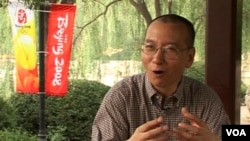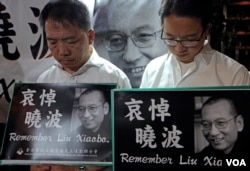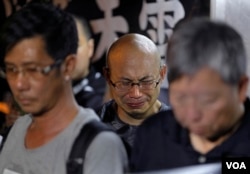Student Union
Liu Xiaobo, Nobel Peace Prize Winner, Dies in Chinese Hospital

China's best-known human rights prisoner, Liu Xiaobo, died Thursday at age 61 following a high-profile battle with liver cancer that made his death as controversial as his life.
Liu, a Nobel Peace Prize laureate who spent his last eight years as a prisoner of conscience, passed away at a hospital in Shenyang, China, where he had been moved from his prison cell in the final stage of his illness. The judicial bureau in Shengyang announced the cause of death as “multiple organ failure.”
Liu’s final days were marked by a public dispute over the quality of his care and Beijing's refusal of a family request that he be transferred for treatment to the United States or Germany. He is the first Nobel laureate to die in state custody since Carl von Ossietzky, who died of tuberculosis under the watch of Nazi secret police in Berlin, Germany, in 1938.
Tributes to Liu quickly poured in from Chinese intellectuals and human rights advocates, who described the former college lecturer as a moderate liberal who advocated peaceful resistance to Chinese authorities.
“He was a man of humanity and an idealist. He’s by no means a politician. Judging from his writings and speech, what he had illustrated is more of a social idealism of humanities,” said Zhang Lifan, a prominent Chinese historian.
Reputation for outspokenness
Liu, whose name means “he who knows the waves,” was born into an intellectual family in 1955 in China’s northeastern province of Jilin. He received his doctorate degree in Chinese literature from Beijing Normal University in 1988.
His reputation as an outspoken dissident had deep roots. In his brief, government-sanctioned role as a popular writer and academic, he was known for his criticism of traditional Chinese culture and for urging his fellow literati to exhibit more individualism. His sharp critiques created a sensation within literary and intellectual circles and won him opportunities to travel abroad as a visiting scholar.
His promising career took a drastic turn in the spring of 1989 when he cut short a visiting scholarship at Columbia University in New York City and returned home to join student-led pro-democracy protests in Tiananmen Square.
“During the June 4th protests, he rushed back to Beijing from the U.S. to take part in the movement without any hesitation. That showed his earnest hope in the society’s transformation and the country’s democratization,” said Hu Jia, a Chinese rights activist and friend of Liu and his family.
Hu credited Liu with saving many lives by encouraging hundreds of students to leave the square rather than confront the Chinese troops who moved into the square with tanks in the early hours of June 4.
Despite that action, and a controversial television appearance in which he cast doubt on reports of a massacre in the square, Liu was labeled a “black hand” and jailed for his role in the protests.
Upon his release in early 1991, he continued to call for political reforms and was sentenced to three years in a labor camp from 1996 to 1999. Liu kept on pursuing his reform goals after his release, making him a constant target for state surveillance.
End to one-party system
In 2008, Liu and other dissidents and intellectuals issued a document known as Charter 08, modeled partly on Charter 77, which Czech dissidents, including Vaclav Havel, drafted in 1977.
The political manifesto, which was endorsed by more than 10,000 intellectuals, calls for an end to China's one-party system and establishment of a new republic comprising a “federation” of regions and political communities, with genuine participation from the public.
“If there has been any progress in the Chinese society and politics over the last 20 years, it is all because the citizens have been pushing for change,” Liu said in an interview that year. “Ultimately, change will happen when problems persist and enough people are concerned.”
Even while he was enjoying relative freedom out of jail, thoughts of when he, and others like him, might be locked up again were never far from his mind.
“For those of us in the opposition movement under dictatorships, part of our job is confronting police, and spending time in prison. So, a dissident not only needs to learn how to oppose oppression, but also how to face the crackdowns, and time in prison,” Liu told reporters from Hong Kong.
'I have no enemies'
Liu's convictions were put to the test in 2009, when he was sentenced to 11 years in prison for his part in the Charter 08 movement and other "subversive" activities. Worldwide fame came soon afterward when he was named as the 2010 Nobel Peace Prize laureate “for his long and non-violent struggle for fundamental human rights in China.”
Liu learned of the honor from his wife during one of the limited prison visits she was permitted. He replied that the prize should be dedicated to those who died in the 1989 mass protests and subsequent crackdown.
Liu was known as an advocate of changing China through reasoned, non-violent means. Shortly before being sentenced in 2009, Liu praised elements of the Chinese legal system, including the polite treatment he received in jail, in a speech titled, “I have no enemies.”
“Hatred can corrupt one’s conscience and intelligence, enemy mentality could poison a nation’s spirit,” Liu said in the speech, which was read in his absence at the Nobel Prize ceremony.
Liu’s remarks confounded many advocates for democracy and freedom for China.
Critics pointed to the harsh treatment, including severe torture, of other activists to show the Chinese prison system is far less “humane” than Liu described it. Some suggested the authorities purposely showed leniency toward Liu so that he would make public statements in their support.
Unfulfilled wish
Liu was still three years from completing his prison term when he died.
The German and American doctors who were allowed to see him during his last days reported that Liu, days before his death, had clearly communicated his wish to leave China for treatment elsewhere. However, Chinese authorities maintained that he was too sick to be moved.
Liu Xiaobo is survived by a son, and his wife of 21 years, Liu Xia, a staunch supporter of her husband who is reported to have said that she was determined to marry the "enemy of the state." Reflecting on their lives in a poem, she said, "I like to draw trees; why? I like the image of it standing. A life spent standing must be tiresome, you say; I answer, yes, but still I must."
See all News Updates of the Day
- By VOA News
Competition grows for international students eyeing Yale

It’s tough to gain admission to Yale University, and it’s getting even tougher for international students as standout students from around the world set their sights on Yale.
The Yale Dale News, the campus newspaper, takes a look at the situation here.
- By VOA News
Student from Ethiopia says Whitman College culture made it easy to settle in

Ruth Chane, a computer science major from Ethiopia, writes about her experiences settling into student life at Whitman College in the U.S. state of Washington.
"The community at Whitman College made sure I felt welcomed even before I stepped foot on campus," she says.
- By VOA News
Claremont Colleges student gets a shock when she heads home to Shanghai

In The Student Life, the student newspaper for the Claremont Colleges, a consortium of five liberal art colleges and two graduate schools in Claremont, California, student Rochelle Lu writes about readjusting to her Shanghai home after spending a semester in the United States.
- By VOA News
Cedarville University aims to ease transition for international students

Cedarville University in the U.S. state of Ohio says it’s got more than 140 international students representing 44 countries.
Here, the school interviews Jonathan Sutton, director of international student services. He talks about his job and the opportunities for international students on campus.
- By VOA News
Morehouse College offers prospective students tips on applying and thriving

Morehouse College, a private, historically Black liberal arts college in the U.S. state of Georgia, offers a guide for international students interested in attending the school.
Among the tips to apply and thrive at Morehouse:
- Take advantage of the school’s orientation program
- Turn to the school’s Center for Academic Success for tutoring, support and more
- Immerse yourself in campus life via clubs and societies
- By Reuters
US reviews Columbia University contracts, grants over antisemitism allegations

The administration of President Donald Trump said on Monday it will review Columbia University's federal contracts and grants over allegations of antisemitism, which it says the educational institution has shown inaction in tackling.
Rights advocates note rising antisemitism, Islamophobia and anti-Arab bias since U.S. ally Israel's devastating military assault on Gaza began after Palestinian Hamas militants' deadly October 2023 attack.
The Justice Department said a month ago it formed a task force to fight antisemitism. The U.S. Departments of Health and Education and the General Services Administration jointly made the review announcement on Monday.
"The Federal Government's Task Force to Combat Anti-Semitism is considering Stop Work Orders for $51.4 million in contracts between Columbia University and the Federal Government," the joint statement said.
The agencies said no contracting actions had been taken yet.
"The task force will also conduct a comprehensive review of the more than $5 billion in federal grant commitments to Columbia University."
The agencies did not respond to requests for comment on whether there were similar reviews over allegations of Islamophobia and anti-Arab bias.
Columbia had no immediate comment. It previously said it made efforts to tackle antisemitism.
College protests
Trump has signed an executive order to combat antisemitism and pledged to deport non-citizen college students and others who took part in pro-Palestinian protests.
Columbia was at the center of college protests in which demonstrators demanded an end to U.S. support for Israel due to the humanitarian crisis caused by Israel's assault on Gaza. There were allegations of antisemitism and Islamophobia in protests and counter-protests.
During last summer's demonstrations around the country, classes were canceled, some university administrators resigned and student protesters were suspended and arrested.
While the intensity of protests has decreased in recent months, there were some demonstrations last week in New York after the expulsion of two students at Columbia University-affiliated Barnard College and after New York Governor Kathy Hochul ordered the removal of a Palestinian studies job listing at Hunter College.
A third student at Barnard College has since been expelled, this one related to the occupation of the Hamilton Hall building at Columbia last year.
Canada’s immigration overhaul signals global shift in student migration
From Europe to North America, nations are tightening their immigration policies. Now Canada, long seen as one of the world's most welcoming nations, has introduced sweeping changes affecting international students. The reforms highlight a growing global trend toward more restrictive immigration policies. Arzouma Kompaore reports from Calgary.
Trump administration opens antisemitism inquiries at 5 colleges, including Columbia and Berkeley

The Trump administration is opening new investigations into allegations of antisemitism at five U.S. universities including Columbia and the University of California, Berkeley, the Education Department announced Monday.
It's part of President Donald Trump's promise to take a tougher stance against campus antisemitism and deal out harsher penalties than the Biden administration, which settled a flurry of cases with universities in its final weeks. It comes the same day the Justice Department announced a new task force to root out antisemitism on college campuses.
In an order signed last week, Trump called for aggressive action to fight anti-Jewish bias on campuses, including the deportation of foreign students who have participated in pro-Palestinian protests.
Along with Columbia and Berkeley, the department is now investigating the University of Minnesota, Northwestern University and Portland State University. The cases were opened using the department's power to launch its own civil rights reviews, unlike the majority of investigations, which stem from complaints.
Messages seeking comment were left with all five universities.
A statement from the Education Department criticized colleges for tolerating antisemitism after Hamas' Oct. 7, 2023, attack on Israel and a wave of pro-Palestinian protests that followed. It also criticized the Biden administration for negotiating "toothless" resolutions that failed to hold schools accountable.
"Today, the Department is putting universities, colleges, and K-12 schools on notice: this administration will not tolerate continued institutional indifference to the wellbeing of Jewish students on American campuses," said Craig Trainor, the agency's acting assistant secretary for civil rights.
The department didn't provide details about the inquiries or how it decided which schools are being targeted. Presidents of Columbia and Northwestern were among those called to testify on Capitol Hill last year as Republicans sought accountability for allegations of antisemitism. The hearings contributed to the resignation of multiple university presidents, including Columbia's Minouche Shafik.
An October report from House Republicans accused Columbia of failing to punish pro-Palestinian students who took over a campus building, and it called Northwestern's negotiations with student protesters a "stunning capitulation."
House Republicans applauded the new investigations. Representative Tim Walberg, chair of the Education and Workforce Committee, said he was "glad that we finally have an administration who is taking action to protect Jewish students."
Trump's order also calls for a full review of antisemitism complaints filed with the Education Department since Oct. 7, 2023, including pending and resolved cases from the Biden administration. It encourages the Justice Department to take action to enforce civil rights laws.
Last week's order drew backlash from civil rights groups who said it violated First Amendment rights that protect political speech.
The new task force announced Monday includes the Justice and Education departments along with Health and Human Services.
"The Department takes seriously our responsibility to eradicate this hatred wherever it is found," said Leo Terrell, assistant attorney general for civil rights. "The Task Force to Combat Anti-Semitism is the first step in giving life to President Trump's renewed commitment to ending anti-Semitism in our schools."
- By VOA News
STEM, business top subjects for international students

The Times of India breaks down the most popular subjects for international students to study in the U.S.
STEM and business lead the pack. Read the full story here. (January 2025)
- By VOA News
Safety and visa difficulties among misconceptions about US colleges

U.S. News & World report addresses some of the misconceptions about U.S. colleges and universities, including the difficulty of getting a visa.
Read the full story here. (January 2025)
- By VOA News
Work opportunities help draw international students to US schools

US News & World Report details the three top factors in foreign students' decision to study in the U.S. They include research opportunities and the reputation of U.S. degrees. Read the full story here. (December 2024)
- By VOA News
British student talks about her culture shock in Ohio

A British student who did a year abroad at Bowling Green State University in Ohio talks about adjusting to life in America in a TikTok video, Newsweek magazine reports.
Among the biggest surprises? Portion sizes, jaywalking laws and dorm room beds.
Read the full story here. (December 2024)
- By VOA News
Harvard's Chan School tells international students what to expect

Harvard's T.H. Chan School of Public Health reaches out to international students by detailing the international student experience at the school.
Learn more about housing, life in Boston and more here.
- By Reuters
China unveils plan to build 'strong education nation' by 2035

China issued its first national action plan to build a "strong education nation" by 2035, which it said would help coordinate its education development, improve efficiencies in innovation and build a "strong country."
The plan, issued Sunday by the Communist Party's central committee and the State Council, aims to establish a "high quality education system" with accessibility and quality "among the best in the world."
The announcement was made after data on Friday showed China's population fell for a third consecutive year in 2024, with the number of deaths outpacing a slight increase in births, and experts cautioning that the downturn will worsen in the coming years.
High childcare and education costs have been a key factor for many young Chinese opting out of having children, at a time when many face uncertainty over their job prospects amid sluggish economic growth.
"By 2035, an education power will be built," the official Xinhua news agency said, adding that China would explore gradually expanding the scope of free education, increase "high-quality" undergraduate enrolment, expand postgraduate education, and raise the proportion of doctoral students.
The plan aims to promote "healthy growth and all-round development of students," making sure primary and secondary school students have at least two hours of physical activity daily, to effectively control the myopia, or nearsightedness, and obesity rates.
"Popularizing" mental health education and establishing a national student mental health monitoring and early warning system would also be implemented, it said.
It also aims to narrow the gap between urban and rural areas to improve the operating conditions of small-scale rural schools and improve the care system for children with disabilities and those belonging to agricultural migrant populations.
The plan also aims to steadily increase the supply of kindergarten places and the accessibility of preschool education.
- By VOA News
A look at financial aid options for international graduate students in US

The Open Notebook, a site focusing on educating journalists who cover science, has complied a list of U.S. graduate program financial aid information for international students.












